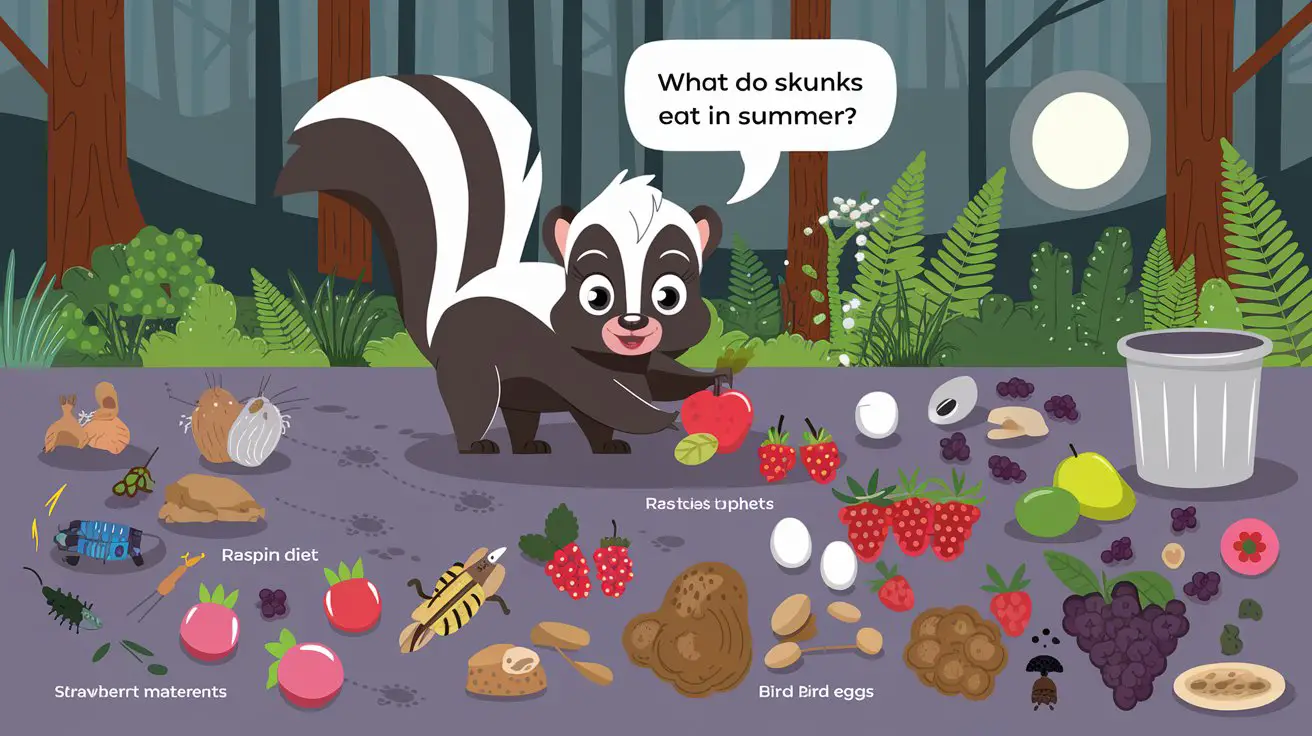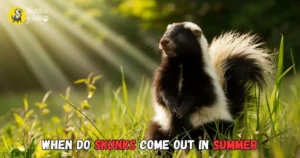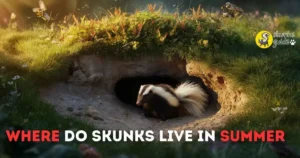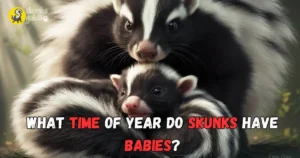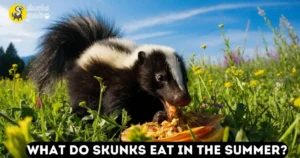What Do Skunks Eat in Summer? Unveiling Their Diet!
Skunks primarily eat insects, fruits, and small animals during the summer months. Their diet is diverse, adapting to available food sources.
Summer offers a bounty of food for skunks. These creatures are omnivorous and opportunistic feeders, making the most of seasonal abundance. Insects like beetles, crickets, and grasshoppers are abundant and provide essential protein. Fruits such as berries, apples, and cherries become ripe, offering sweet nutrition.
Skunks also forage for small rodents, eggs, and plants. Their keen sense of smell helps them locate food easily. This adaptability allows skunks to thrive in various habitats, from urban areas to forests. Understanding skunk diets can help homeowners manage potential encounters while appreciating these unique animals in their natural environment.
Introduction To Skunk Summer Diets
Summer brings changes to what skunks eat. These small mammals adapt their diets based on food availability. Understanding their eating habits helps us appreciate these unique creatures.
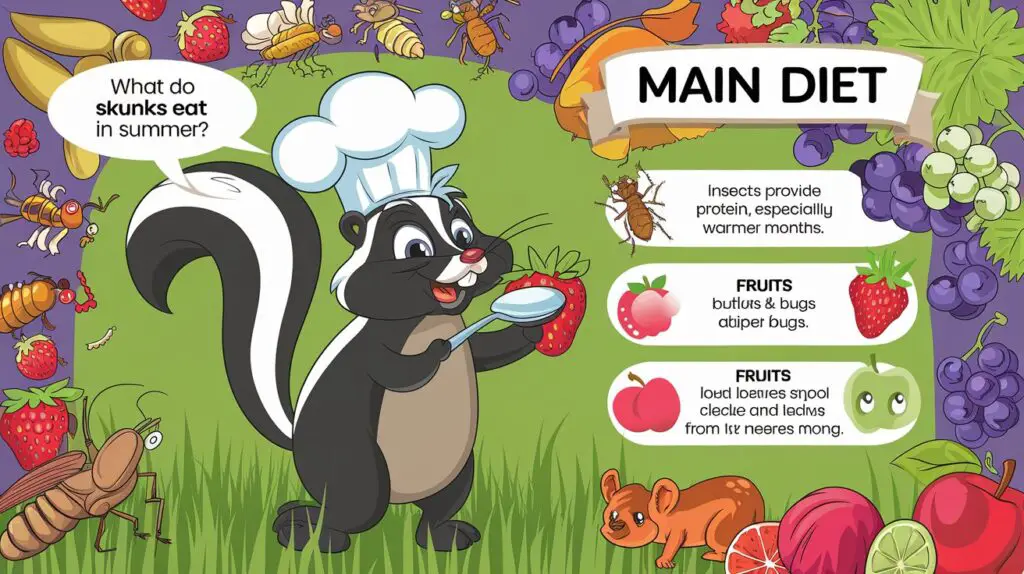
Skunks As Omnivores
Skunks are classified as omnivores. This means they eat both plants and animals. Their diet includes:
- Fruits: Berries, apples, and melons.
- Vegetables: Corn, carrots, and leafy greens.
- Insects: Beetles, crickets, and grasshoppers.
- Small animals: Mice, birds, and eggs.
This varied diet helps skunks thrive in summer. They find food in gardens, fields, and forests.
Seasonal Dietary Shifts
Skunks change their diets with the seasons. In summer, they focus on fresh foods. Here’s how their diet shifts:
| Season | Main Food Sources |
|---|---|
| Spring | Insects and young plants |
| Summer | Fruits and vegetables |
| Fall | Nuts and seeds |
| Winter | Stored food and scavenging |
Summer offers abundant fruits and insects. Skunks take advantage of this. They help control insect populations while enjoying tasty snacks.
Natural Food Sources In Warmer Months
During summer, skunks find plenty of food. The warm weather brings a variety of natural sources. Skunks enjoy a diverse diet. They are opportunistic eaters. Their choices depend on what is available.
Insects: A Skunk Staple
Insects make up a big part of a skunk’s diet.
- Beetles
- Grasshoppers
- Ants
- Crickets
Skunks are excellent at hunting insects. They dig in the ground to find them. Insects provide protein. This helps skunks stay healthy and strong.
Fruits And Berries Bounty
Fruits and berries are another favorite.
| Fruit/Berry | Benefits |
|---|---|
| Strawberries | High in vitamins and antioxidants |
| Blackberries | Good source of fiber |
| Apples | Rich in vitamins A and C |
| Peaches | Contains essential nutrients |
Skunks eat these fruits directly from bushes and trees. They love the sweet taste. Fruits offer hydration during hot days. Skunks play a role in spreading seeds too.
The Role Of Small Rodents And Eggs
Skunks play an important role in the ecosystem. They help control pest populations. In summer, they often hunt small rodents and eggs. These foods provide essential nutrients. Understanding their diet helps us appreciate their role in nature.
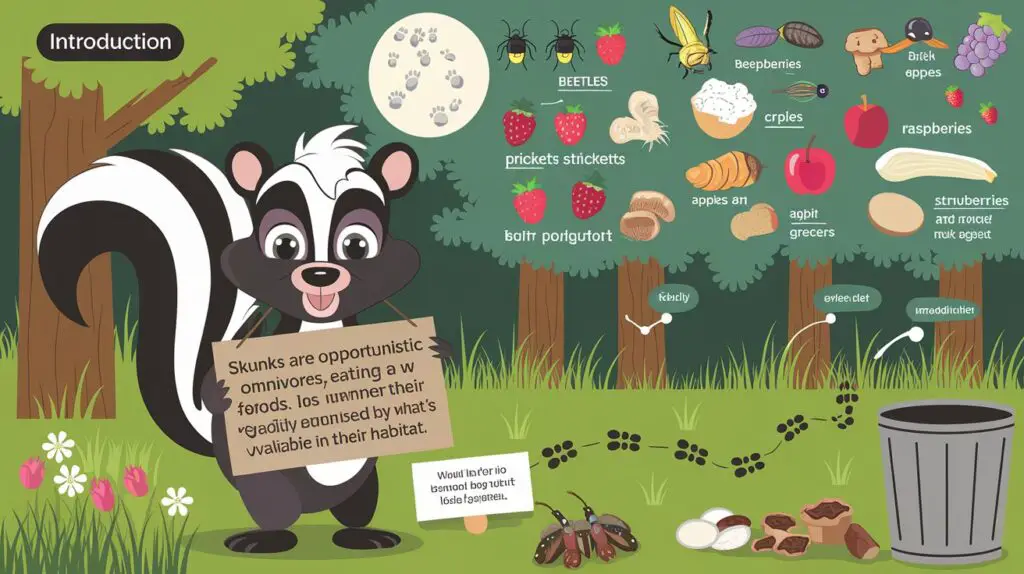
Hunting Techniques
Skunks use various hunting techniques to find food. Here are some methods they employ:
- Burrowing: Skunks dig into the ground to find rodents.
- Stalking: They quietly approach their prey.
- Sniffing: Skunks have a keen sense of smell.
They are mostly nocturnal. This means they hunt at night. Their stealthy approach helps them catch small animals. Skunks can also climb trees to find bird nests for eggs.
Nutritional Value
Small rodents and eggs are rich in nutrients. Here’s a breakdown of their benefits:
| Food Type | Key Nutrients | Benefits |
|---|---|---|
| Small Rodents | Protein, Fat | Supports muscle growth and energy |
| Bird Eggs | Protein, Vitamins, Minerals | Boosts immunity and overall health |
These foods help skunks thrive in summer. They need energy for their active lifestyle. A balanced diet keeps them healthy and strong.
Vegetation And Plants On The Menu
Summer brings a variety of food options for skunks. These animals enjoy a mix of vegetation and plants. They play a vital role in their diet. Understanding what they eat can help in wildlife observation.
Roots And Shoots
Skunks dig for tasty roots and shoots. These food sources are rich in nutrients. Common roots they eat include:
- Carrots
- Beets
- Turnips
Shooting plants like wild onions are also popular. Skunks use their sharp claws to unearth these goodies. This behavior helps in soil aeration.
Leafy Greens
Skunks love to munch on leafy greens. They often seek out:
- Spinach
- Lettuce
- Collard greens
These greens provide hydration and essential vitamins. Skunks may eat them directly from gardens. They enjoy both cultivated and wild varieties.
Observing skunks can reveal their feeding habits. Their diet varies by location and availability. Summer is a prime time for exploring their food choices.
Human Influences On Skunk Diets
Humans greatly impact what skunks eat. Our actions change their food sources. Skunks adapt quickly to new diets. This shift often revolves around our waste and leftovers.
Garbage And Compost
Skunks are opportunistic feeders. They find a feast in our garbage. Common items in their diet include:
- Fruit peels
- Vegetable scraps
- Old bread
- Leftover meat
Composting also attracts skunks. They enjoy:
- Composted fruits and veggies
- Decomposing food waste
Leaving garbage unsecured leads to visits from these critters. Proper waste disposal helps keep skunks away.
Pet Food Opportunities
Skunks are drawn to pet food. Outdoor feeding stations attract them. They enjoy:
- Dog food
- Cat food
Leaving pet food outside increases skunk visits. It’s essential to feed pets indoors. This simple step reduces unwanted guests.
| Human Food Sources | Skunk Attraction |
|---|---|
| Garbage | High |
| Compost | Medium |
| Pet Food | Very High |
Water Intake During The Hot Season
During summer, skunks face high temperatures. They need to stay hydrated. Water intake becomes crucial for their health. A lack of water can affect their overall well-being. Understanding their hydration sources helps us learn about their habits.
Sources Of Hydration
Skunks find water from various sources. Here are some common ones:
- Ponds and lakes
- Streams and rivers
- Rainwater collected in puddles
- Garden birdbaths
- Pet bowls left outside
Skunks may also eat moisture-rich foods. Fruits and vegetables contribute to their water intake. Some examples include:
| Food Item | Water Content (%) |
|---|---|
| Watermelon | 92 |
| Cucumber | 95 |
| Strawberries | 91 |
| Peaches | 89 |
Impact On Diet
Water intake influences skunks’ diets significantly. Proper hydration allows them to digest food better. It helps them absorb nutrients efficiently. Skunks may seek out moist foods during summer.
Some effects of hydration on diet include:
- Increased energy levels
- Improved foraging behavior
- Better immune function
- Enhanced reproduction rates
Skunks adapt their eating habits based on water availability. They prioritize foods that contain high moisture. This adaptation helps them survive the heat.
Predators And Prey: The Food Chain Impact
The relationship between skunks and their predators shapes the food chain. Understanding this dynamic helps us see how ecosystems function. Skunks play a unique role as both prey and predator. Their eating habits impact many other species in their habitat.
Skunk Predators
Skunks face threats from various predators. Here are some common skunk predators:
- Coyotes: Fast and cunning, they hunt skunks at night.
- Bobcats: Stealthy hunters that can catch skunks off-guard.
- Great Horned Owls: They swoop down silently to catch skunks.
- Domestic Dogs: Sometimes chase skunks, leading to fatal encounters.
These predators help control skunk populations. Without them, skunk numbers might grow too large. This could harm other species and the ecosystem.
Skunk Prey Dynamics
Skunks are omnivores. They eat a variety of foods, impacting other creatures in their habitat.
Common skunk foods include:
- Insects: Beetles, crickets, and caterpillars.
- Fruits: Berries, apples, and grapes.
- Small Animals: Mice, voles, and other rodents.
- Plants: Roots and tubers.
By eating insects, skunks help control their populations. This benefits crops and gardens. Skunks also serve as prey for larger animals.
The balance between skunks and their predators keeps nature in check. It ensures a thriving ecosystem, where every species plays a vital role.
Conservation And Skunk Habitats
Skunks play a vital role in our ecosystems. Protecting their habitats ensures their survival. Understanding their habitats helps in conservation efforts. Different environments support their feeding habits and overall health.
Habitat Protection
Skunks thrive in various habitats. They prefer:
- Forests
- Grasslands
- Urban areas
- Farmlands
Protecting these areas is essential. Here are ways to help:
- Support local conservation groups.
- Plant native plants in your garden.
- Avoid using harmful pesticides.
- Preserve wetlands and natural areas.
Feeding Habits And Ecosystem Health
Skunks are omnivores. Their diet includes:
| Food Type | Examples |
|---|---|
| Fruits | Berries, apples, and grapes |
| Insects | Beetles, grasshoppers, and ants |
| Small Animals | Rats, mice, and birds |
| Plants | Roots and tubers |
Healthy skunk populations indicate a balanced ecosystem. Their diet helps control pests. This balance is crucial for farmers and gardeners.
Frequently Asked Questions
What Is Skunk’s Favorite Food?
Skunks primarily enjoy insects, fruits, and small rodents. They also eat plants and roots. Their diet is varied and opportunistic, adapting to available food sources. Skunks are known for foraging at night, making them effective scavengers in their habitats.
What Attracts Skunks To Your Yard?
Skunks are attracted to yards for food sources like pet food, garbage, and fallen fruits. Dense vegetation provides shelter and nesting sites. Standing water can also draw them in. Keeping your yard clean and well-maintained helps deter these curious creatures from visiting.
Will Skunk Eat Squirrels?
Skunks are omnivorous and can eat small animals, including squirrels. They primarily hunt for insects, fruits, and small rodents. While it’s not their main food source, skunks may prey on young or injured squirrels if the opportunity arises.
Where Do Skunks Go During The Day?
Skunks are nocturnal animals, so they sleep during the day. They seek shelter in burrows, under decks, or in dense vegetation. This behavior helps them avoid predators and conserve energy until nightfall when they venture out to forage for food.
Conclusion
Understanding what skunks eat in summer helps you appreciate their role in the ecosystem. These creatures are opportunistic feeders, enjoying fruits, insects, and small animals. By knowing their diet, you can better coexist with them. Protecting their habitat ensures a balanced environment for all wildlife.
Skunks contribute to nature in many beneficial ways.

